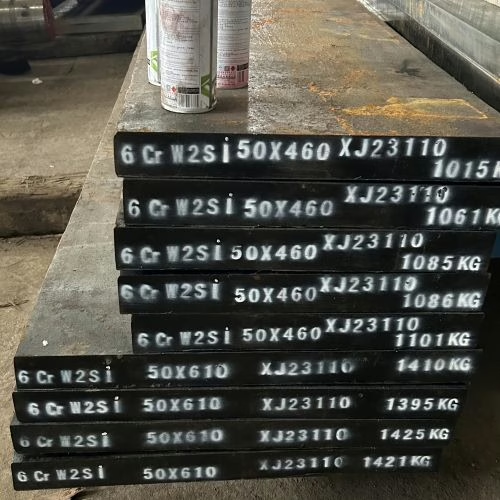6CrW2Si tool steel is a versatile alloy tool steel suitable for both cold and hot working applications, characterized by its impact toughness and wear resistance. Compared to the 4CrW2Si and 5CrW2Si grades, 6CrW2Si typically achieves higher hardness after quenching and exhibits better strength at elevated temperatures.
1. Chemical Composition(GB/ T 1299—2000)
| C | Si | Mn | Cr | W | P | S |
| 0.55 ~ 0.65 | 0.50 ~ 0.80 | ≤0.40 | 1.10 ~ 1.30 | 2.20 ~ 2.70 | ≤0.030 | ≤0.030 |
2. Critical Point Temperature of 6CrW2Si
| Critical Point | Ac₁ | Ac₃ | Ms |
| Temperature (Approx. Value) /°C | 775 | 810 | 280 |
3. Forging Process Specification for 6CrW2Si Steel
| Item | Heating Temperature/°C | Initial Forging Temperature/°C | Final Forging Temperature/°C | Cooling |
| Steel Ingot | 1170 ~ 1200 | 1150 ~ 1180 | ≥850 | Slow Cooling |
| Steel Billet | 1150 ~ 1170 | 1100 ~ 1140 | ≥800 | Slow Cooling |

Please fill out the form to contact us to get the most competitive quotation for 6CrW2Si steel.
4. Heat Treatment for 6CrW2Si Steel
1) Preheating of 6CrW2Si
| Preliminary Heat Treatment Plan | Process Parameters |
| Post-forging General Annealing | Heating temperature is 800 ~ 820°C, hold for 3 ~ 5h, furnace cool to below 550°C, then air cool. Hardness is 229~285HBW. Microstructure is granular pearlite + small amount of carbides. |
| High-temperature Tempering Process | Heating temperature is 700 ~ 730°C, hold for 2 ~ 4h, furnace cool to below 500°C then air cool. The purpose is to improve the machinability of the steel. |
2) Quenching of 6CrW2Si
| Quenching Temperature/°C | Quenching Cooling Medium | Quenching Cooling Medium Temperature/°C | Cool to | Hardness HRC |
| 860 ~ 900 | Oil | 20 ~ 40 | Oil Temperature | ≥57 |
3) Tempering of 6CrW2Si
① Tempering Process Specification
| Purpose | Tempering Temperature/°C | Heating Medium | Cooling Medium | Hardness HRC |
| Eliminate internal stress and stabilize microstructure | 200 ~ 250 | Oil or molten salt | Air | 53 ~ 58 |
| Reduce hardness and eliminate internal stress | 430 ~ 470 | Air furnace or molten salt, saltpeter | Air | 45 ~ 50 |
② Relationship between Hardness and Tempering Temperature
| Tempering Temperature/°C | Not Tempered | 100 | 200 | 300 | 400 | 500 | 550 | 600 |
| Hardness HRC | 59 | 58 | 56 | 53 | 49 | 42 | 38 | 35 |
Note: 880°C oil quenched.
5. Mechanical Properties
6CrW2Si steel possesses relatively high toughness, high as-quenched hardness, a certain degree of high-temperature strength, and high fatigue strength. It exhibits slight temper brittleness when tempered in the range of 300-350°C. The hardness can reach 54-56 HRC after tempering at 250°C, and 50-52 HRC after tempering at 450°C. This steel’s resistance to tempering and its wear resistance are slightly superior to those of 5CrW2Si steel, but its toughness is comparatively lower.
Chromium-tungsten-silicon (Cr-W-Si) series steels demonstrate high sensitivity to decarburization, and their quenching deformation is difficult to control. Under abrasive wear conditions, they show insufficient wear resistance, and their impact toughness is lower than that of impact-resistant steels containing Molybdenum (Mo) and Nickel (Ni).
6. Applications
6CrW2Si steel is often used to manufacture heavy-duty stamping dies and cold-pressing dies where the failure modes are wear and collapse, or for manufacturing tools and dies that are subjected to impact loads and require high wear resistance, such as pneumatic tools, impact dies, cold shearing blades, blanking and trimming dies, and tools for air hammers.
7. Equivalent Grades
Get a Competitive Quote for 6CrW2Si Tool Steel
With over 20 years of forging expertise, Aobo Steel is your trusted partner for high-performance 6CrW2Si tool steel. We provide not just materials, but solutions. Leverage our deep industry knowledge and reliable supply chain for your project’s success.
✉ Contact us by filling out the form below.
Explore Our Other Products
D2/1.2379/SKD11
D3/1.2080/SKD1
D6/1.2436/SKD2
A2/1.23663/SKD12
O1/1.2510/SKS3
O2/1.2842
S1/1.2550
S7/1.2355
DC53
H13/1.2344/SKD61
H11/1.2343/SKD6
H21/1.2581/SKD7
L6/1.2714/SKT4
M2/1.3343/SKH51
M35/1.3243/SKH55
M42/1.3247/SKH59
P20/1.2311
P20+Ni/1.2738
420/1.2083/2Cr13
422 stainless steel
52100 bearing steel
440C stainless steel
4140/42CrMo4/SCM440
4340/34CrNiMo6/1.6582
4130
5140/42Cr4/SCR440
SCM415

